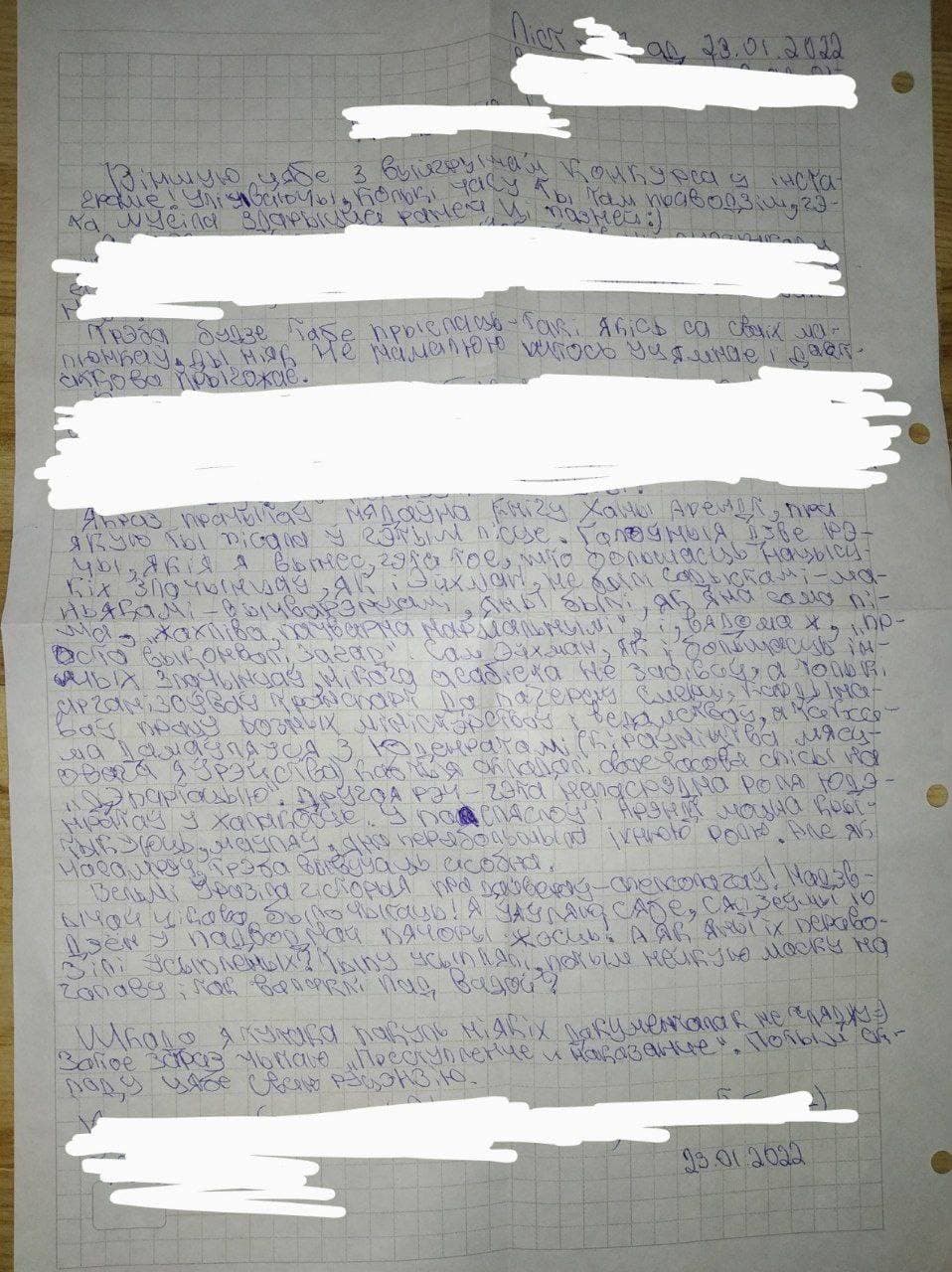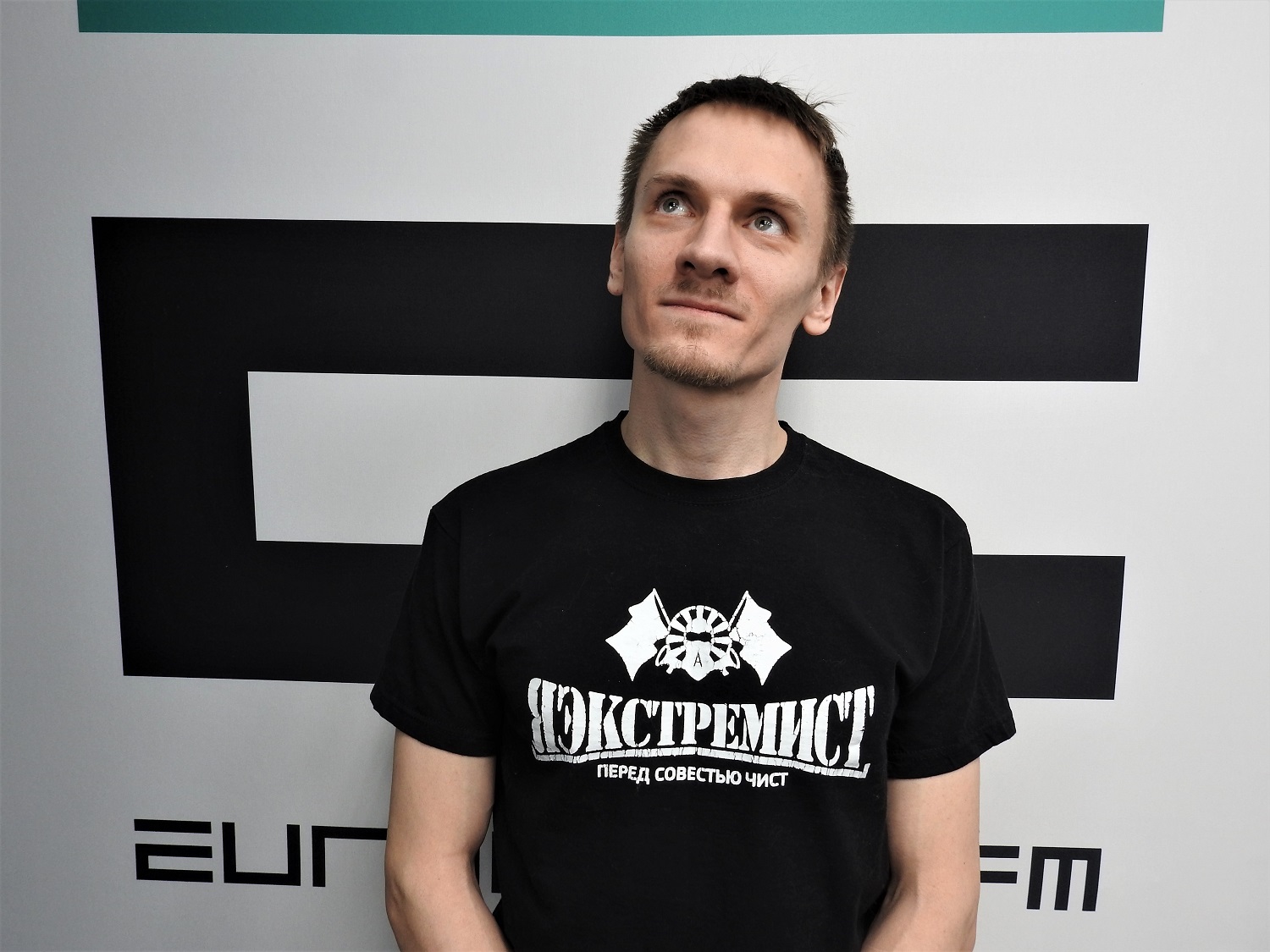LETTERS FROM LUKASHENKA'S PRISONERS
Mikola Dziadok
Anarchist and blogger
Detained on 11 November 2020
"How quickly time flies! It would seem that it was just the New Year, and now it's already the 20th. At this rate, they will release me quickly =)"
READER'S NOTE:
Mikola Dziadok is an anarchist and blogger from the Belarusian district of Mogilev. He was previously held as a political prisoner between 2010 to 2015, when he wrote essays about daily life and the key elements of the Belarusian prison system. His essays formed the collection, The Colours of the Parallel World, which received PEN Belarus’ Francišak Aliachnovič Award in 2017.
Mikola is now once again a political prisoner, having been detained on the evening of 11 November 2020 as part of the crackdown that followed the presidential election in August that year. According to reports, when he arrived at the detention centre, Mikola was beaten with a truncheon, administered an electric shock via his heels, and threatened with rape in an effort to elicit a forced confession. On 10 November 2021, he was sentenced to five years in a general regime colony, including for his alleged involvement in actions that “grossly violate public order” and for calling for actions aimed at harming national security.
“All participants in the process with a legal education can see and understand what is happening. I just want to thank my relatives, friends, journalists, human rights activists, all those who are not indifferent, everyone who appreciates my work, for supporting me during this year and helping me financially. It is very important for me,” Mikola said at the end of his trial. “To everyone who is involved in organising this trial and other political repressions in my country, I want to say: do not have any illusions! No piece of paper you have written, no terror can stop a person’s liberation and progress. We will win anyway!”
In February 2022, he was transferred from a detention centre in Volodarka (Minsk) to one in Gorki, eastern Belarus. Since then, he has reportedly been deprived of longer family visits and subject to solitary isolation in so-called “punishment cells”, which are frequently dirty and extremely cold. Sometimes letters to and from Mikola travel with significant delays; other times they get lost altogether.
Mikola wrote the letters below to a friend. While these letters were written before the Russian invasion of Ukraine, still now prisoners’ letters do not refer to the war. Prisoners do not have access to newspapers or television reports that mention the war. Those that do know about the war may have learned from their lawyers and they are not permitted to write about it.
In both letters, Mikola writes about what he has been reading. He refers to a stack of magazines and newspapers, including the newspaper Nezavisimaya Gazeta – “NG”. While being critical of the Putin regime, NG is more moderate than publications such as Novaya Gazeta and Meduza. Mikola says he was “pissed off” with their coverage of the sentencing of Belarusian anarchists, Ihar Alinevich, Dzmitry Rezanovich, Siarhei Ramanau, and Dzmitry Dubouski (who were handed down sentences of between 18 to 20 years at the end of December 2021), but it is not clear why. He also says he’s been reading Mikhail Bulgakov’s The Master and Margarita.
In his second letter, he mentions Hannah Arendt’s Eichmann in Jerusalem and Fyodor Dostoevsky’s Crime and Punishment. His reference to “speleologist divers” regards the documentary The Rescue (2021) about the divers who saved children in Thailand. His friend had told him the story in her previous email.
As evident from the images of his hand-written letters below, Mikola’s friend has redacted some sections from each of the letters so as not to share some personal details of their correspondence.
Letter 1:
20.01.2022
How quickly time flies! It would seem that it was just the New Year, and now it’s already the 20th. At this rate, they will release me quickly =)
I have good news – a stack of magazines and newspapers [that were forwarded] from Volodarka detention centre has arrived, including a thick copy of NG. Now I’m reading it and I feel high. One thing pissed me off from how they – the Russian NG – wrote about the verdict to Alinevich and Co.
In my last letter I promised you my review of The Master and Margarita. Of course, you’ve read this novel =) And I tried to read it twice – when I was 12 and 17. Both times it didn’t stick. Probably because expectations were too high. After all, the novel is quite mainstream, and only a lazy reader does not praise him and does not call him a masterpiece. Well, based on that, I was “disappointed”.
But this time around, I liked it. One gets the impression that the novel is “multilayered”, filled with allusions and metaphors, and the author’s contemporaries served as prototypes for the characters. However, all these invisible clues can be broken only by knowing the context of the time and the life path of the author. In short, I would like to read a historical and literary analysis of this novel, but there is no such thing yet =)
Happy New Year (albeit late) and I firmly believe that it will bring us only good!
Letter 2:
23.01.2022
Congratulations on winning the Instagram contest! Considering how much time you spend there, it had to happen sooner or later :)
I will have to send you one of my drawings, but I will not draw something interesting or beautiful.
I’ve just read the book by Hannah Arendt that you wrote about in your letter.
The two main things I learned were that most Nazi criminals, like Eichmann, were not sadistic perverted maniacs, they were, as she writes, “terribly, hideously normal” and, of course, just “maintaining order”. Eichmann himself, like most other criminals, did not personally kill anyone, but only organised transportation to death camps, coordinated the work of various ministries and departments, and negotiated with the Judenrat (local Jewish leadership) on the timely compilation of lists for deportation. The second thing was about the role of the Judenrat in the Holocaust.
In the afterword, Arendt is heavily criticised for allegedly exaggerating [Eichmann’s] role. But in fact I think it needs to be studied separately.
I was very impressed by the story about the speleologist divers! It was extremely interesting to read! I imagine sitting for 10 days in an underwater cave. Like in a tin can! And how they were transported sleeping!? The way they put them to sleep, put a mask on their heads, and dragged them like that under the water!?
It’s a pity that I haven’t watched any documentaries here as of yet =) And now I’m reading “Crime and Punishment”. I will give you my feedback later.



